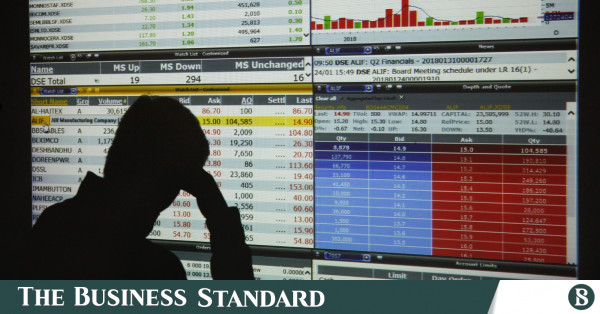Stocks bearish run persists for 4 weeks


The blue-chip index of the Dhaka Stock Exchange (DSE) – the country’s premier bourse – nosedived to a 42-month low. Photo: Mehedi Hasan/TBS
“>
The blue-chip index of the Dhaka Stock Exchange (DSE) – the country’s premier bourse – nosedived to a 42-month low. Photo: Mehedi Hasan/TBS
The bearish trend in the country’s capital market continued for four weeks, as reflected by a 15-point decline in the Dhaka Stock Exchange’s (DSE) benchmark index last week amidst economic uncertainties and cautious investor sentiment.
The DSEX closed at 5,237 points, down 0.28% from the previous week.
EBL Securities stated in its weekly market review that investors remained watchful of the market’s trend due to concerns surrounding the national budget declaration, although some investors sought positions in sector-specific stocks with quick gain potential after significant corrections.
Investor participation slightly rebounded as average turnover increased by 16% to Tk451 crore compared to the previous week.
The blue-chip DS30 index, comprising 30 prominent companies, lost nearly 17 points to 1,858, while the DSES index, representing Shariah-compliant companies, fell 7 points to 1,136.
In the FY25 budget, Finance Minister AH Mahmood Ali proposed a 15% tax on individual investors’ capital gains exceeding Tk50 lakh from listed securities during a time when the country’s investor-dominated stock market was in a free fall.
Capital market stakeholders have called upon the government to refrain from this move, citing its panic-inducing effect on an already fragile market. Additionally, the proposal to narrow the corporate tax gap between publicly traded and non-listed companies to 500 basis points, instead of the recommended 750 basis points widening, was seen as discouraging firms from going public, contrary to stakeholders’ and regulators’ calls.
Meanwhile, the finance minister allowed the investment of black money in the stock market, conditioned on a 15% tax payment without scrutiny.
Abu Hena Md Rahmatul Muneem, chairman of the National Board of Revenue, emphasised in a post-budget press conference that taxation was not the root cause of the capital market’s issues, despite longstanding tax incentives not fostering market growth.
Saiful Islam, president of the DSE Brokers Association, stressed, “We oppose any tax burden on the capital market now, as it has suffered for years amid the global crisis, which could negatively impact general investors.”
He highlighted the challenges brokerage firms have faced due to reduced market participation during the ongoing crisis. Concerns were raised that the implementation of a capital gains tax this year could further unsettle the capital market.
Mohammad Ali, a chartered accountant, said, “Implementing taxation on individual stock market gains now could hinder capital market development, especially as investors are already facing losses from market downturns.”
He contrasted this with India, which introduced a long-term capital gains tax in 2018 after two centuries of stock market history, indicating Bangladesh’s nascent stage in market taxation.
The capital market has grappled with economic uncertainty worsened by the Russia-Ukraine war since its onset. To safeguard general investors from capital erosion, the Bangladesh Securities and Exchange Commission (BSEC) imposed a floor price in 2022 to halt share freefalls.
After over two years, the BSEC lifted the restriction, but the DSE’s key index subsequently plummeted over 1,000 points, prompting numerous investors to exit.
In response, the BSEC re-implemented measures to protect investors, including reducing the circuit breaker limit from 10% to 3%.




